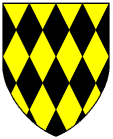
LIVES OF THE BISHOPS OF EXETER
RICHARD BLOND or BLONDY. - The Newenham Abbey Register informs us that he was a native of Exeter, and Hoker in his MS. history relates that he was the son of Hilary Blondy, who filled the mayoralty chair here in 1227. For many years he had discharged the office of Chancellor of this Cathedral, and is commended for his blameless life and learned attainments. Strange to say, both Godwin and his continuator Richardson appear to confound him with John Blondy, who had been accused of simony in obtaining his election to the see of Canterbury in the autumn of 1232! Our worthy prelate was consecrated at Reading on 1st December, 1245: we meet with him at Beaulieu on the 7th July following, where he confirmed the appropriation of St. Breaca's Church, Cornwall, granted by Richard Earl of Cornwall to Hales Abbey. In the 'Monasticon' of the diocese we have published in p. 59 a deed of this bishop in favour of the Collegiate Church of Crediton, and another in p. 165, concerning Holbeton vicarage.
On 6th January, 1247, he confirmed Bishop Marshal's mandate respecting the. sixteen chapels or churches within the walls of Exeter and its immediate suburb, viz. Trinity, St. James, St. Michael in the Deanery, St. Mary Major, St. Mary Minor, St. Petrock, SS. Simon and Jude, St. Martin, Christ Church, St. Kerrian, St. Cuthbert, All Saints on the Walls, All Saints in Goldsmith-street, St. Clement, St. David, and St. Sidwella.
Godwin represents him as weak-minded and indolent, and that his officials and servants took advantage of his easy character to enrich themselves, by counterfeiting collations to ecclesiastical preferments. This erroneous impression originates in the confusion of times and circumstances. Had the biographer turned to pages 1 and 5 of the register of his successor, Bishop Walter Bronescombe, he would have ascertained the following facts : - 1st, that Richard died in his palace here on 26th December, 1257; that his successor in the see, on hearing the report of such forgeries, "sub nomine defuncti episcopi," directed a commission of inquiry on the Friday after Candlemas Day, 1259, to the Dean and Archdeacon of Exeter, to proceed to the excommunication of the parties offending, who had acted "præter conscientiam et mandatum venerabilis Patris Ricardi predecessoris nostri;" that Walter de Loddeswell, chancellor to the deceased prelate, and Richard de Totton, notary public, moved by a sense of true repentance, appeared before the bishop in the Chapter-house of Buckfastleigh Monastery on 19th March next ensuing, and then and there voluntarily confessed before him, and the Abbot of Buckfastleigh, and others, that, on being sent for, they reached Bishop Blondy's chamber in the night, and found some of his household, clerks and laymen there assembled, who related that the bishop was reduced to the last extremity of weakness, and that they were occupied in the disposal of his effects, in granting away benefices, and in drawing up and signing letters for that purpose that they had bound each other to perpetual secrecy, and that they did actually dispose of benefices, and draw up and sign such letters; but whether the bishop was then a corpse or not, deponents cannot say: certainly they never heard him utter a syllable, and never afterwards saw him alive, - that the other persons present on the occasion were John Fitz-Robert, the official, Gervase of Crediton, Thomas of Holland, Henry the chaplain, Henry of Christow, Thomas the panter (Panetarins), and his son Reginald, William de Fuleford, and Caynoc the chamberlain - that the said John Fitz-Robert and Gervase dictated the letters, and that Thomas of Molland and Richard, the afore-said notary public, did write them, and that Henry, the chaplain, signed them - that after the parties were distinctly satisfied of the bishop's death, many other letters were written and signed. The said two deponents now most humbly and devoutly solicited the benefit of absolution. The Register adds, that on the next Easter Monday Waiter Loddeswell "in capella Domini Episcopi apud Exon" publicly and solemnly cleared himself of any guilty or fraudulent act of writing, signing, or alienating; but that Richard de Totton, being convicted of having received orders, under false testimonials, since the bishop's death, was "hoc ipso" suspended, and that he submitted to a course of penance before he received absolution. Bishop Blondy is said to have been buried on the north-side of the choir of his church, and an ancient inventory records his gift of a covering for his tomb. He had purchased an estate in Lovenetorre, in Paignton parish, and assigned it to his chapter for the maintenance of his obit. It was subsequently conveyed to the see itself, as we find by Bishop Quivil's deed of February 3rd, 1283, for the yearly payment of 1l. 13s. 4d., to fulfil the donor's intention.
Arms: - Lozengy or and sable.

![]() Previous Bishop
Previous Bishop ![]() Return to list of Bishops
Return to list of Bishops ![]() Next Bishop
Next Bishop